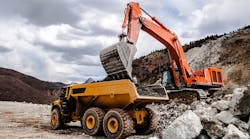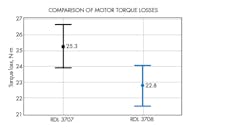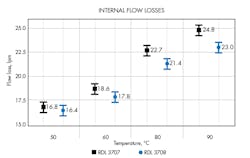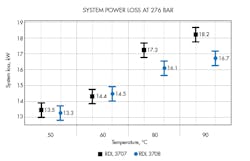The efficiency of hydraulic power transmission is affected by flow and pressure losses within a machine. Flow losses, due to internal leakage through gaps in pumps, valves, and motors reduce the volume of fluid available to create machine motion. Pressure losses, due to mechanical and fluid friction, reduce the linear and rotary force available to lift or move the payload. The net effect is that volumetric losses decrease system efficiency while pressure losses increase energy consumption.
Putting Fluid Efficiency to the Test
Petro-Canada Lubricants teamed up with the Fluid Power Institute at Milwaukee School of Engineering to investigate how hydraulic fluids affect machine productivity and energy consumption. Milwaukee School of Engineering is a private university and home of the Fluid Power Institute, one of the leading academic fluid power research centers in North America.
In this study, a hydraulic dynamometer—consisting of a Danfoss Series 45 variable-displacement, axial-piston pump, and a Danfoss Series 90 fixed-displacement hydraulic motor—was used to evaluate fluid efficiency. This pump and motor combination is similar to a hydraulic system that might be found on the swing drive of an excavator, the propulsion system of a skid-steer loader, or the winch on a hydraulic crane.
Two fluids were evaluated: a conventional, mineral oil-based monograde fluid (3707) and Petro-Canada’s high-performance Hydrex XV all-season (3708) fluid. Hydrex XV is a semi-synthetic, multigrade hydraulic fluid formulated with a shear stable polymer and carefully selected additives to maximize viscosity stability and fluid longevity. The fluids were tested at 50°C, 60°C, 80°C, and 90°C. The hydraulic pump speeds were 800 rpm, 1,200 rpm, and 1,800 rpm, while the hydraulic motor speeds ranged from 1 to 600 rpm. The system pressure was regulated from 67 to 276 bar in 34 bar intervals by a proportional electrohydraulic compensator control. A total of 1,782 data points were collected for each fluid during this demonstration.
Hydraulic motor torque, pump flow, and system power losses were the key performance properties examined in this study. These three parameters quantify the energy inputs that do not produce work.
Higher Friction, Higher Fuel Consumption
Motor torque losses were determined based upon the difference between the theoretical and measured torque output of the motor. Torque losses at low speeds are due to friction between moving surfaces. At high speeds, a large volume of oil is required to rotate the hydraulic motor. This results in high pressures at the outlet of the motor, which reduces the torque available to move the load.
As shown in Fig. 1, Hydrex XV exhibited 10% lower torque losses than the conventional monograde at 90°C. Reducing torque losses in a hydraulic machine could increase how far a skid steer pushes its bucket into a gravel pile or increase how deep a horizontal boring machine drives its augers into the ground.
1. This comparison of axial-piston motor torque losses illustrates that machines using Hydrex XV 3708 high-efficiency hydraulic fluid exhibit lower friction than those using a conventional, monograde oil 3707.
Lower Flow, Lower System Efficiency
The flow losses for the dynamometer were measured for the pump case, compensator valve, directional control valve, and hydraulic motor. These flow losses are the result of pressure-driven flow through hydrostatic and hydrodynamic gaps within the machine. Hydrostatic losses occur at constant gap interfaces, such as in directional and pressure compensator control valves. Hydrodynamic flow losses occur at moving gap interfaces, such as between the piston and cylinder wall.
In both cases, flow losses have the greatest impact when the machine is operating at high pressures and temperatures. As shown in Fig. 2, the monograde fluid showed higher average flow losses than Hydrex XV at 60°C, 80°C, and 90°C. Reducing flow losses in a machine could increase the trenching speed of a backhoe loader or decrease the time it takes for an agricultural spraying machine to fertilize a field.
2. A comparison of the internal leakage flow shows that machines using high-efficiency hydraulic fluid transmit greater flow to move actuators faster and perform work than systems using conventional oils.
Power loss is the difference between the input and output power of a hydraulic machine. Hydraulic systems are designed to minimize power losses, so that the maximum amount of energy is converted into work. Typically, this is accomplished by regulating the input power of the pump through load-sensing or pressure compensator control. The power losses in the dynamometer were determined from the difference between the input power of the pump and the output power of the hydraulic motor.
As shown in Fig. 3, the monograde fluid showed higher losses than Petro-Canada Lubricants’ Hydrex XV (3708) at 276 bar. These losses not only reduce the work output of the machine, they increase the oil temperature, which in turn intensifies the cooling requirements of the machine. Since it takes power to drive the cooling fan, the energy consumption of the machine increases as well. This twofold loss in efficiency is like riding a bicycle not only uphill, but also with a flat tire.
3. Comparing system power losses in hydraulic machines using Hydrex XV (3708) are more productive, require less fuel, and operate at a lower temperature than machines using a conventional oil.
Summary
Using energy-efficient Hydrex XV gets you where you are going faster while using less energy, by increasing the hydraulic system flow rate and motor torque output, while reducing energy loss and consumption. On mobile equipment, this inevitably leads to lower fuel consumption needed to drive the hydraulically controlled functions of the machine. One example is seen in the video below, demonstrating 5.5% fuel savings with Cruickshank Construction:
These benefits are greatest when the machine is working hard and power is needed the most: at peak loads and elevated temperatures. In today’s business where heavy equipment is often being pushed to the limit, this creates a significant energy savings opportunity by selecting the right high-performance fluid.




